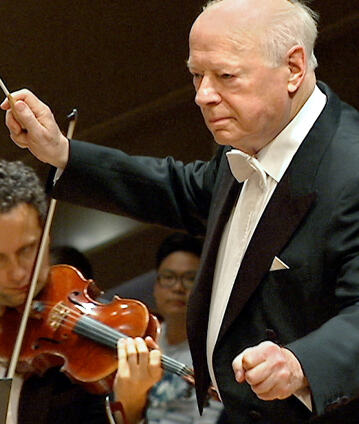Bernard Haitink conducts Beethoven and Wagner

The heroic in Beethoven’s Eroica is often expressed with ostentatious urgency – Bernard Haitink’s interpretation by contrast, has a different energy which is fed by inner peace and effortlessness. The beginning of the concert shows us two different sides of Richard Wagner: lyrical in the Siegfried Idyll, and uncertain yet full of passion in the Wesendonck Lieder. The soloist is Mihoko Fujimura.
“Written for Bonaparte” are the words Beethoven pencilled in 1804 on the title page of his Third Symphony, hitherto known as a Sinfonia grande. After Napoleon had himself crowned emperor – which Beethoven took to be a betrayal of the ideals of the French Revolution – the name of Bonaparte no longer appeared on the printed score. Instead, the composition, now named Sinfonia eroica, celebrated “the memory of a great man”. Much has been written about the fit of rage in which Beethoven reportedly scratched out the dedication upon learning of the imperial coronation.
Less well known are the Third Symphony’s connections to the Prometheus myth. Beethoven’s first grappled with the subject of the ancient Greek bringer of fire, an important symbol for the Enlightenment, in his ballet The Creatures of Prometheus, premiered in 1801 in Vienna. Can it be coincidental that he took up a theme from that work in the Eroica’s finale? Surely not, stated none other than Johann Wolfgang von Goethe five years after Napoleon’s death: “What has he brought to mankind like that Prometheus – he has also brought light: a moral enlightenment.”
By contrast, the two works chosen by Bernard Haitink for the first half of his concert with the Berliner Philharmoniker inhabit an utterly private world. Richard Wagner wrote the Siegfried Idyll on themes from his music drama by that name in 1870 as a 33rd birthday present for his wife Cosima, while his Wesendonck Lieder of 1857–58 – adumbrating music from Tristan and the Ring – bear witness to an amour fou between the composer and the author of the songs’ texts, poetess Mathilde Wesendonck.
© 2012 Berlin Phil Media GmbH
Related interview
Artists
Our recommendations
- The 1999 Europakonzert in Krakow with Bernard Haitink, Emanuel Ax and Christine Schäfer
- Bernard Haitink conducts Mahler’s Seventh Symphony
- Bernard Haitink and Leif Ove Andsnes perform Brahms’s Second Piano Concerto
- Bernard Haitink conducts Mahler’s Seventh Symphony
- Bernard Haitink conducts Mahler’s First Symphony
- Bernard Haitink conducts Bruckner’s Fifth Symphony